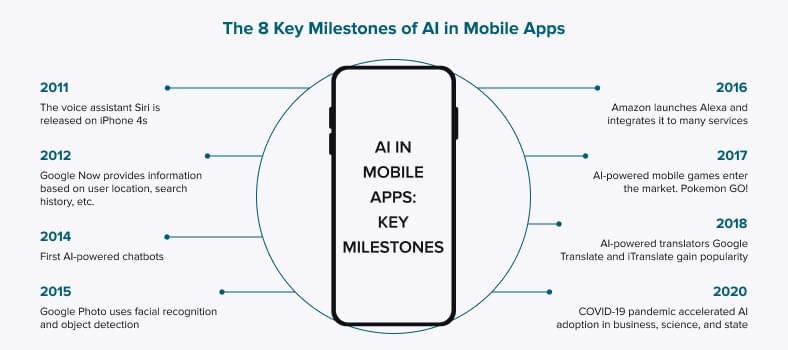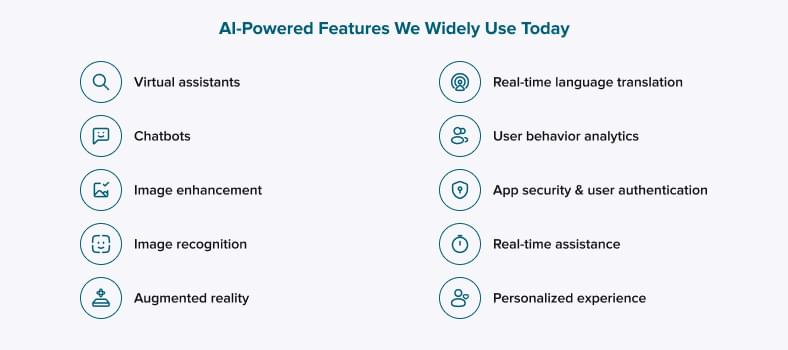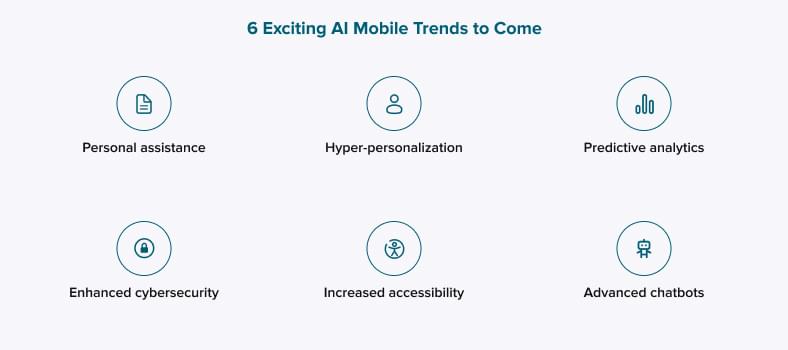Have you noticed how much AI has crept into the mobile apps we use every day? From route optimization to personalized recommendations, artificial intelligence is transforming our mobile experience.
Keep your eyes on the latest trends of AI in mobile app development, and you will be amazed at how much more intelligent your phone becomes!
The Evolution of AI in Mobile Apps: How Far We Have Come
Just a decade ago, we mostly knew about AI from sci-fi movies and far-fetched concepts, and today mobile AI changes how we use our phones, surf online, communicate, and shop.

The first AI-enhanced mobile features appeared in the 2010s, and the iPhone was one of the first smartphones benefiting from innovations. The first AI-powered iPhone feature was text prediction. It used machine learning to guess the next word a user would type.
Today, we use algorithms every day without even noticing it:
- AI powers predictive text, autocorrect, and smart compose features that save our time typing;
- Voice assistants like Siri, Google Assistant, and Alexa help us get things done hands-free;
- AI enables face unlock, photo tagging, and other features in social media apps and optimizes routes in navigation apps like Google Maps and Waze.

The future is bright for AI in mobile apps, with no shortage of possibilities on the horizon.
Key Trends of the Mobile AI Industry to Anticipate in the Near Future
The industry’s rapid progress in such a short time is astounding. And as AI continues to advance, mobile apps will become even more capable.
The Market Research Future predicts that in the next decade, the mobile AI market will grow 24.5% each year and achieve 80.5 billion USD by the end of 2030. The increasing number of mobile phones worldwide and the further rollout of 5G technology will continue to nourish the industry.
Here are the main exciting trends to watch in the next few years.

AI-Powered Chatbots
AI chatbots can be used for various purposes, such as customer service, informational support, booking appointments, and more. You, as a business, receive the following:
- 24/7 availability for customers: Chatbots do not need breaks so companies can provide customer support outside of traditional business hours.
- Cost-effectiveness: Chatbots do not require human involvement in contrast to traditional customer service.
- Scalability: Chatbots can be scaled up or down easily, which makes them a good fit for businesses with fluctuating demand.
- Personalization: Chatbots positively affect customer experience by providing an individual approach to every customer.
With the further development of mobile AI technologies, chatbots will be better at:
- understanding user prompts and answering naturally and engagingly;
- providing more personalized information;
- integrating with other applications and devices for a better user experience.
Hyper-Personalization
By analyzing user data, preferences, and behavior, AI can customize content and features for each individual. Mobile apps will anticipate what users want and need based on their unique profiles.
So what exactly do you get with hyper-personalization?
- Increased engagement: Users are more likely to engage with content tailored to their interests;
- Improved customer satisfaction: Users will be glad to buy products and services that were picked for them,
- Increased sales: Businesses sell more by targeting customers with the right products or services.
Predictive Analytics
By analyzing numerous metrics like user behavior, preferences, retention, and purchases, algorithms predict risks, lifetime value, and optimal pricing. It is a valuable source of insights guiding business and development decisions.
As technologies evolve, AI in mobile apps will foresee user needs and take proactive actions, for example:
- suggesting restaurants based on user location, diet, and previous ratings;
- alerting to leave early based on current traffic conditions;
- Reminding users to exercise, take medication, or drink water.
Enhanced Cybersecurity
Artificial intelligence is a great helping tool to protect smartphones and applications from cyberattacks, and we expect this niche to expand. Today, the most common ways to implement AI for cybersecurity are:
- Machine learning is used to create models able to identify malicious activity, such as phishing attacks or malware infections;
- Natural language processing analyzes text and identifies potential threats, like malicious links or spam messages;
- Image recognition helps detect malware infections or suspicious activity, for example, someone trying to take a picture of your screen;
- Behavioral analytics can identify suspicious patterns, such as unusual login attempts or changes in browsing habits.
Interested in machine learning? Take a look behind the curtains to learn about possible ML challenges
Read more
Increased Accessibility
AI-infused apps can effectively assist people with disabilities (for example, visual or auditory impairment) and significantly raise the quality of their living. Here are possible directions for development:
- Built-in accessibility features. For example, Apple’s VoiceOver and Google’s TalkBack can read aloud text on the screen;
- Assistive mobile apps that provide a variety of services to help scan the environment or communicate (text-to-speech translation, voice control, and image recognition);
- AI-powered virtual assistants like Siri and Alexa can control devices, get information, and make appointments with voice commands.
Comprehensive Personal Agents
Bill Gates, a philanthropist, Microsoft co-founder, and a big AI believer, says the future belongs to AI technology as a personal agent.
This technology will save us time by reading our emails and messages, doing online shopping, and searching for information on the web.
“That’s a big thing because you’ll never go to a search site again. You’ll never go to a productivity tool again. You’ll never go to Amazon again. Everything will be mediated through your agent,” explains Gates.
And of course, this personal agent will fit in the pocket for maximum convenience and become a part of our future mobile experience.
Final Thoughts
AI revolutionizes mobile app development and how we connect, learn, work, and live through apps. At the same time, user expectations for mobile solutions and their features are widening. Businesses have to keep up with the times.
The potential of AI in mobile app development seems endless, so why don’t you use your opportunities? Start now with a short call. Years of experience in providing AI app development services have positioned us as industry leaders. Our experts are here to help you start AI transformations at this very moment.
About the author
Kate Bugakova
Head of Strategic Partnerships
Kate's mission is to cultivate and maintain relationships with business partners and also develop strategies to increase partner companies' revenue.





